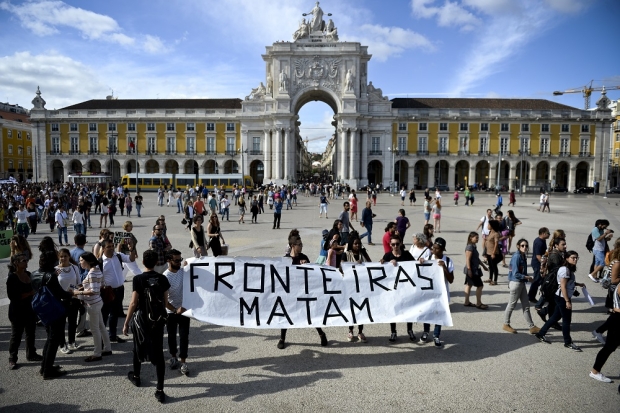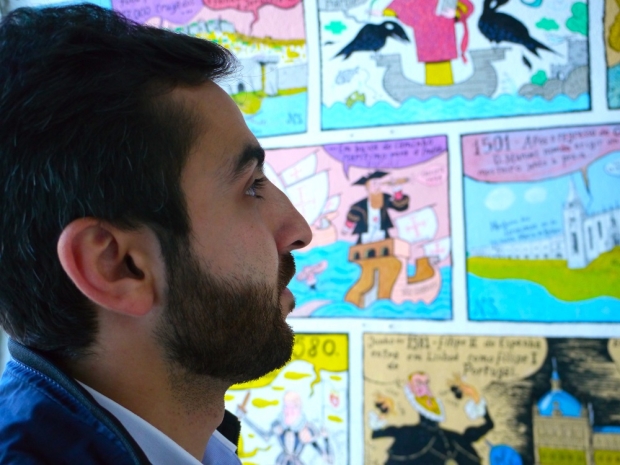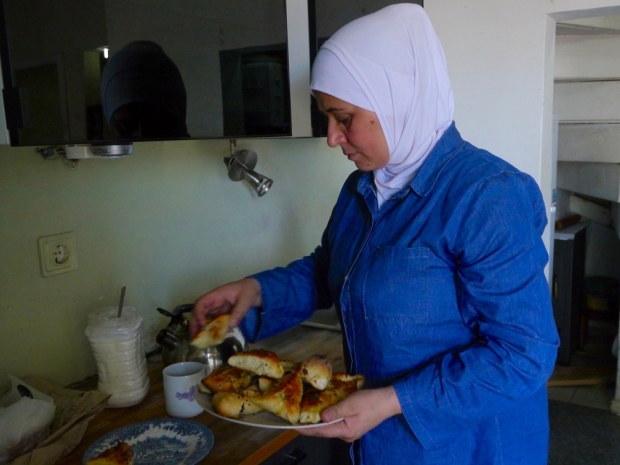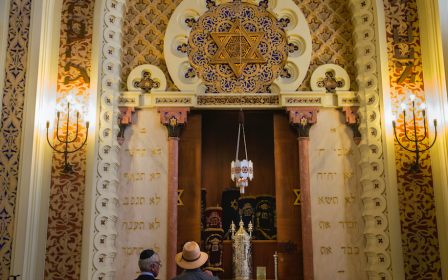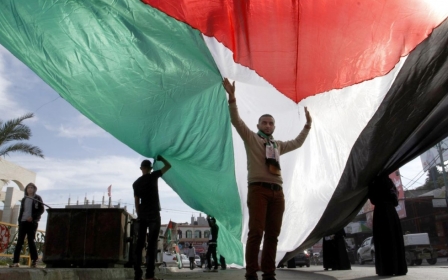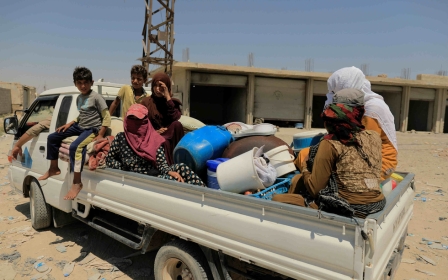Portugal, the country that can't get enough refugees

LISBON – Mohamad Abou Ras has a cellphone full of questions. Five to six drop into his WhatsApp every day from migrants in Turkey and Greece, and others already in more western parts of Europe.
"I've been accepted to Portugal – what's the situation there?" is a common query. Others are more specific - on healthcare, housing and Portuguese language classes.
Abou Ras answers them all, sharing his own experience as a refugee and referring them to official sources where possible. After only eight months in the country, the 27-year-old has become a guide to others looking to settle here. "I didn't know anything!" he said. "I didn't know Portugal was in the European Union. I just knew Cristiano Ronaldo."
Despite volunteers such as Abou Ras and a community willing to help, a generous state offering safety and security, and a favourable climate and relaxed culture, Portugal is finding it hard to attract refugees in any significant numbers, let alone keep those who arrive.
So far, Portugal has received roughly half of the 2,951 asylum seekers it is legally required to take in from camps in Greece and Italy under the EU emergency relocation scheme, the vast majority coming from the Middle East.
At the same time, more than 40 percent of those who have arrived have left within 18 months, according to May figures cited in Portuguese media.
Open arms, open borders
At a time when EU members are closing their borders or grudgingly taking their "share" of migrants, Portugal has adopted a "come on down" attitude. The prime minister, Antonio Costa, in 2015 said his country could support 10,000 refugees when asked to take in 1,600 through the emergency relocation scheme.
While there has not been too much talk of the 10,000 figure since then, the country has formally pledged to take close to 4,600, far more than its obligation.
Portuguese families and churches offer homes, clothing and language exchanges. Syrian babies born in Portugal are celebrated in the media. There is little of the right-wing rhetoric seen in countries such as the UK, focused on the "burden" of migrants.
The state offers 18 months of free housing, a monthly stipend of 150 euros ($177) for each migrant, and access to language classes to integrate new arrivals into Portuguese society.
Why then, does Portugal struggle to fill its quotas? The reasons are myriad.
There are no family or friend networks that support the arrival of other refugees
- Cristina Santinho, Lisbon University Institute
First, there is the lack of established ethnic communities. Portugal simply does not have a history of immigration comparable to Germany, France and Britain, particularly from Arabic-speaking countries.
"The number of refugees and asylum seekers is still very, very small in comparison with other countries," said Cristina Santinho, a researcher specialising in refugees and human rights at the Lisbon University Institute (ISCTE-IUL), where she also hosts an integration course for new arrivals.
"So there are no family networks and no friend networks that support the arrival of other refugees."
Second, the state's generous welcoming package is hampered by poor management and a patchwork of competing systems, meaning some of what is promised is poorly delivered.
Third is jobs. While Portugal's economy has been recovering since the financial crisis, it is heavy on service and tourism-based jobs that require good language skills. Most arrivals speak neither English nor Portuguese.
And lastly is location: some refugees find themselves placed not in the bustling cities of Porto and Lisbon but in rural areas where the cultural isolation and language shocks are more pronounced.
Refugees step in
These are problems Abou Ras wants to help migrants overcome through an association he recently founded with a handful of other asylum seekers, called "Families of Refugees". But it's a hard nut to crack.
Part of the puzzle is better connecting the newcomers with the various institutions that offer support, he said.
The idea is simple: when newcomers need help applying for their social security number or have trouble figuring out the bus system, someone with experience would lend a hand – think of an expat-help bureau but for asylum seekers.
"We are refugees and we know what refugees need," said Abou Ras. "We can help."
They also hope Families of Refugees can eventually partner on cultural events and employment projects with the main institutions responsible for refugees here.
Those institutions recognise the need for interlocutors that build bridges like these.
"It's actually become kind of a running gag with our colleagues in other organisations that refugees are more in touch with each other than their social workers and case workers are," said Luis Bernardo, a project officer with the Portuguese Refugee Council, known as CPR in Portuguese.
As the implementing partner in Portugal of UNHCR, the UN refugee agency, it provides housing and legal aid to new arrivals, among other services.
Refugees are more in touch with each other than their social workers
- Luis Bernardo, Portuguese Refugee Council
"It becomes hilarious talking to clients because they know more about the operations of other organisations than we do."
While Portugal's all-hands-on-deck response to the refugee crisis shows genuine solidarity, he said, it has also made for a patchwork system. "There is no judgment on my part, it was a political decision and I have to respects it, but the state entirely relied on civil society organisations to provide capacity."
In practice, this means that asylum seekers are placed on arrival with different support organisations and may also have access to different services.
Time running out
The al-Hasan al-Khedeirs, a family of seven from Aleppo, Syria, now live in Marvila, a plush area not far from Lisbon's airport. In Syria, Yusef, 44, worked as an accountant at a factory. His wife, Mona, 39, sold clothes.
When Aleppo became unlivable, they headed for Turkey, found steady work there, and over three years built a new life among family and friends.
"We had no plan of coming to Europe," Mona said over tea and homemade pastries in the family's Lisbon living room.
But their middle son, 15-year-old Lawrence, had an eye condition that required a special operation, and they were advised to seek treatment in Portugal, she said. They applied for a special medical status and were allowed to come.
A year later, Lawrence has yet to be seen by a specialist – his appointment is in October – and the family is fast approaching the end of their free housing and financial support.
Yusef and Mona have had a hard time finding work, meaning they will soon rely on social security and council housing – yet another bureaucracy to master in a language they do not speak.
"We found a volunteer who would teach us Portuguese, but they lived far away," Yusef said. In an effort to save money, the family went about on foot.
"We would walk for an hour and a half to have an hour-long Portuguese class. And then we'd walk an hour and a half back," he said. "And sometimes the teacher would not show up, so we had walked three hours for nothing."
We would walk for an hour and a half to have an hour-long Portuguese class. And then we'd walk an hour and a half back
- Yusef al-Hasan al-Khedeir
Their school-aged children, meanwhile, have been sitting at home entertaining each other, equally isolated by their lack of language and community. They will attend school for the first time this autumn.
"We speak in the language of food now," said Mona, who started a small catering enterprise to subsidise their income, cooking Syrian food for a handful of people she knows in the larger refugee support community in Lisbon.
Yusef, who has had two heart attacks since arriving in Portugal, started importing Syrian products – coffee, sweets, fruit tobacco – and selling them to Middle Eastern restaurants through a Facebook page he set up.
"We do what we can," he said.
Meanwhile, Mona's sister, who was relocated to Sweden around the same time the al-Hasan al-Khedeirs arrived in Portugal, has found steady work there, bought a car and just went on her first vacation.
Do they regret coming here? "Yes," said Mona. But now that they're here, they're going to try to make it work. "We have no other choice."
In support of integration
Experiences like theirs are not uncommon, Bernardo knows. It is part of the reason why some of the more lofty ideas behind Portugal's openness to refugees – the idea that they could fix Portugal's demographic decline and provide an economic pick-me-up to sleepy rural areas – are too simplistic, he said.
"The problem is not so much that [these ideas] don't make sense. It's that they overlook and underestimate structural problems that we really need to face," he said. "Does the country provide the necessary structures for short-term integration?"
Less than two years into accepting the first Syrian asylum seekers, organisations like CPR are learning from their experiences. And faced with many voluntary departures, they're re-assessing their course of action.
Placing individual families in remote corners of Portugal where there are limited services, for example, hasn't helped them integrate or build a sense of belonging here.
Both Bernardo and Santinho agree that there's a serious skill shortage in cultural mediation and intercultural communication that needs to be solved with future arrivals.
Leaving Portugal behind
Mahmoud Zamzom, 29, is one of them. Speaking via Skype from an asylum centre in Berlin, the Homs native and his family of three left Portugal after being relocated here under the emergency scheme.
Back in Greece, Zamzom had already set his sights on Germany, but when his family was accepted by Portugal, he wanted to at least check it out, he said. Like others before him, he had heard mixed stories through the worldwide web of refugees, WhatsApp.
"But I wanted to see it with my own eyes," he said.
Right on arrival the family was placed in a small village near Porto. The house lacked heating, and they felt isolated.
He asked the organisation responsible for them if they could be placed in Lisbon or a larger city, but he was told it would be their home for the next year and a half. Five days after arriving, he and his family were on their way to Germany.
Now his asylum request in Germany has been rejected, and under the EU's Dublin agreement covering responsibility for refugees his family will need to return to Portugal. Zamzom is set on fighting the decision.
"We have family here, and I know I can find a job easily," he said of Berlin.
It is but one example of why the Dublin agreement simply doesn't work, according to Bernardo.
You will have a very large number of people being forced back to Portugal when they really don't want to be here
- Luis Bernardo, Portuguese Refugee Council
"In the foreseeable future what you will have is a very large number of people being forced back to Portugal when they really don't want to be here," he said.
"It puts a toll on workers like me and my colleagues because we want to support people. And what we see is we will never provide people with what they need, which is their families and their friends."
These short stays are not a new phenomenon, though, Santinho stressed. Historically, refugees have always treated Portugal as more of a place to catch their breath and travel on, she said.
"Portugal is a poor country without expectations of getting a job easily. It's not an attractive country to stay."
But it is important to remember, she said, that many of the problems refugees face are similar to those that poor Portuguese people struggle with.
Making it work
Abou Ras, meanwhile, is determined to make it work here – for himself and for others.
He is working on a website for his association and setting up regular food events in Lisbon to bring Syrians and locals together. Proceeds will go to the chefs and their families. Mona will be one of them.
It is a bit of balm to soothe the growing pains of a system adjusting to new demands in a time of emergency, but in a community as small as the Middle Eastern refugee population here it could make a difference.
In the autumn, Abou Ras will start classes at one of Lisbon's universities in human resources management, a move he hopes will make finding a job easier.
Classes will be all in Portuguese, and he's been studying hard.
"Portugal is still the best place for refugees," he said, as he watched a tram trundle through the Moorish Alfama district of Lisbon.
"People here are nice, they want to help - elsewhere else they hate us."
This article is available in French on Middle East Eye French edition.
New MEE newsletter: Jerusalem Dispatch
Sign up to get the latest insights and analysis on Israel-Palestine, alongside Turkey Unpacked and other MEE newsletters
Middle East Eye delivers independent and unrivalled coverage and analysis of the Middle East, North Africa and beyond. To learn more about republishing this content and the associated fees, please fill out this form. More about MEE can be found here.


